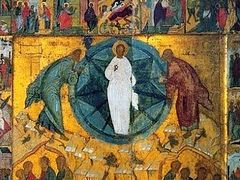 V. Morgon. Apostle Philip and Nathanael. Engraving.
V. Morgon. Apostle Philip and Nathanael. Engraving.
Philip findeth Nathanael, and saith unto him, We have found Him, of Whom Moses in the law, and the prophets did write, Jesus of Nazareth, the son of Joseph. And Nathanael said unto him, Can there any good thing come out of Nazareth? (Jn. 1:45-46).
Both of them, Philip and Nathanael, wanted to believe in the right way, praise God rightly, that is, to be Orthodox. But for them it meant first of all to determine who was the true Messiah. With such an intention they approached Christ. Seeing Nathanael, Christ said, Behold an Israelite indeed, in whom is no guile. Nathanael saith unto Him, whence knowest Thou me? Jesus answered and said unto him, Before that Philip called thee, when thou wast under the fig tree, I saw thee (Jn. 1:47-48).
What happened under the fig tree we do not know. But we do know that Christ hit on just the right point, got right to the heart of this man. Here is Nathanael’s answer:Rabbi, Thou art the Son of God (Jn. 1:49). Nathanael truly and rightly praised Christ, and in this way he became the first Orthodox man. And all because Christ touched his heart, touched something intimate lying deep, deep within Nathanael’s heart.
The triumph of Orthodoxy always starts in a person’s heart, and only afterwards is it expressed externally. True, sometimes there are cases when the external attracts the heart, as if waking it up. But for this to happen, there must be something in the heart, which makes such an awakening possible. God demands our heart. To serve God without heart, Orthodoxy without heart—this is the same as a man without heart.
And here today’s Gospel speaks about the same thing. A paralytic was brought to the Lord, carried by four people. Unable to get near Christ because of the multitude, they removed the roof of the house, broke through and lowered the bed on which the paralytic was lying. See how difficult it all was. This is the fulfillment of the commandment of love in external life. Yes, such is life in the triumph of Orthodoxy.
But where is its source? Let’s listen further: When Jesus saw their faith, He said to the paralytic, Son, thy sins be forgiven thee (Mk. 2:5). These four had faith in their hearts, and this faith impelled them to make every effort to help; and seeing this faith, Jesus helped. The external happened as a result of the internal. God did not say at once to the paralytic: "Arise, take up thy bed," but said, "Son, thy sins be forgiven thee." See, not the external first, but the internal. After all, sin was in the heart. A heart paralyzed by sin could not sense God in Christ and could not rightly praise Him. And here Christ healed this heart, made it Orthodox. And then followed the external: I say unto thee, Arise, and take up thy bed and go thy way into thine house (Mk. 2:11).
But what would have happened if the Lord had started with the second thing, with the external healing? The paralytic would have gotten up in the same way, would have taken his bed and gone, but only with a heart which was dead from sin. This would have been a living corpse. Here is what the Pharisees could not understand. Whether is it easier, said Christ to them, to say to the paralytic, Thy sins be forgiven thee, or to say, Arise, and take up thy bed, and walk? But that ye may know that the Son of Man hath power on earth to forgive sins, (He saith to the paralytic) I say unto thee, Arise, and take up thy bed and go thy way into thine house (Mk. 2:9-11). To this paralytic the Lord gave both the internal and the external. And he walked home and brought there with him the quiet feeling of the triumph of Orthodoxy.
And here, St. Gregory Palamas, to whom this Sunday of Great Lent is dedicated, shows us so clearly by his whole life that Christian life, Orthodox life, always begins in our heart, and only then expresses itself in feats of asceticism.
From The One Think Needful






